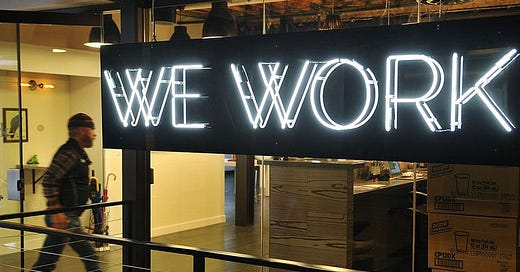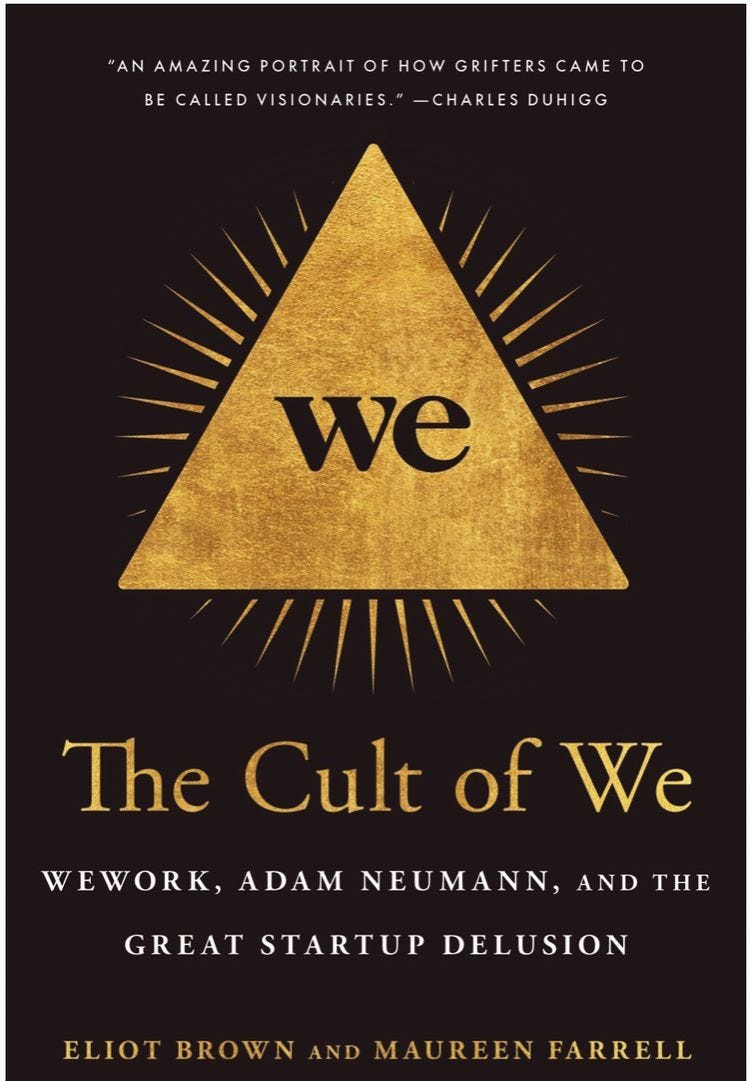BONUS: What happened to WeWork?
A lot of people are blaming the pandemic, but others worried about it earlier. Here's an article I wrote in early 2019.
WeWork, the serviced office giant, officially declared bankruptcy on Monday. Experts say “First, and most obvious, this was the pandemic.” Bloomberg writes “The disruption wrought by Covid-19 and a surge in telecommuting ultimately proved too much.”
I do not think it is so obvious that it was the pandemic. Frankly, after a few years in the 90s working for a big real estate developer during a recession, I thought from the start that it was a dumb business model. I wrote this now-deleted post for Treehugger (but I had backups!) in January 2019, a year before the pandemic, which I republish here as a told-you-so bonus.
Coworking Is a Great Idea, but Can WeWork Survive?
Sharing resources and renting just what you need is smart for the tenant, but how does it work?
We love the idea of coworking. It is what we used to call a PSS, or Product Service System, which Warren described as something that "you only need pay for the time you use it." But having worked in the real estate development business some years ago and been through a few real estate cycles, I have never understood WeWork, the corporate coworking behemoth. The idea of leasing long-term and subletting short-term made no sense, given that your tenants could disappear back to their bedrooms and coffee shops in minutes when the economy turned. It's what we used to call the "midnight shuffle" when tenants were gone overnight.
It is a shame, because the concept is so TreeHugger; as Kim has described what we knew as the coworking movement:
...there's more to coworking than just "sharing desks". To make a coworking space actually work, there has to be a common vision, a shared identity of sorts, allowing for deeper connections between its members to happen, and a desire to develop an underlying support system that keeps people engaged and makes them feel like they belong.
Most of the coworking spaces we show are small, and perhaps a bit idealistic. WeWork is big business renting acres of space. But is it a good business? One of the smartest guys in Toronto real estate and owner of dozens of buildings, Michael Emory of Allied Properties, doesn't get WeWork either. He told the Globe and Mail last year:
Maybe WeWork will go from success to success. I have no real rational way of evaluating it. It is a very high-risk proposition for a landlord and an investor. At some point and time, some investor may be holding the bag on WeWork.
And now WeWork has rebranded after expanding into spaces for living and teaching. According to Fast Company,
Going forward, the company will no longer be called WeWork but rather The We Company. The new structure is part of Neumann’s heady ambition to push the company’s market and opportunity beyond commercial real estate. Rather than just renting desks, the company aims to encompass all aspects of people’s lives, in both physical and digital worlds, he says.
According to the Financial Times, WeWork lost $1.2 billion in the first nine months of 2018. They have no intention of slowing down, even though they just lost $14 billion of a $16 billion investment. From FT:
Executives at WeWork have vowed to continue investing in expansion, despite accumulating losses. “Our view is that there is tremendous wind at our back — we are the only serious global player out there,” Michael Gross, WeWork’s vice-chairman, told the FT in November.
I wonder. We love the idea of coworking, and WeWork is coworking on steroids. It is terrific for startups; it lets people share resources, cutting down the number of printers and coffee machines and routers needed for all those small businesses. They really know how to design nice spaces. But as Shira Ovide wrote on Bloomberg:
[CEO Adam] Neumann told Fast Company that an economic downturn would be an opportunity for his company. He’s wrong. WeWork can exist only because of robust economic conditions for its commercial real estate tenants and for the capital markets of young technology companies.
But WeWork is not a technology company. It's a real estate company, with bricks and mortar and $18 billion in lease commitments.
Sharing is a greener way to work, and if I were starting a business today, WeWork is probably where I would do it, because I know that if a recession hits and things get rough, I am not stuck with an expensive lease. WeWork is, and I suspect that will sink it.
Here also is my review of “The cult of We”





